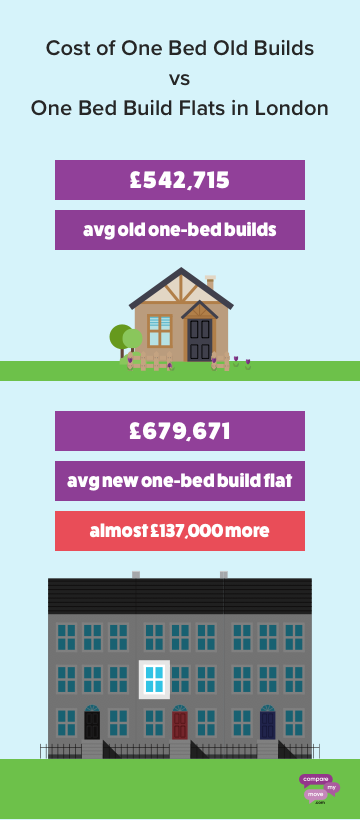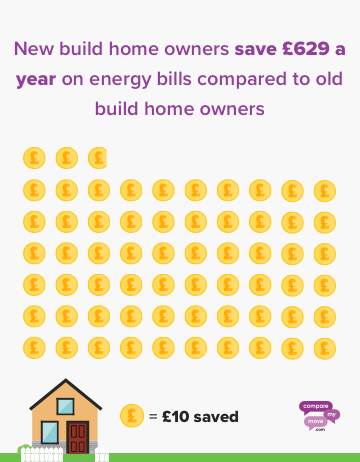Buying a New Build vs Old House: Which is Better?
With choosing the perfect place to call home, there are a variety of decisions to make. A major factor to consider is new build vs old house. But whether you want to invest in an older house or have a fresh start with a new build home, it’s largely based on your own preference.
Some people are immediately drawn to the charm and stability of an older house whilst others yearn for the blank canvas of a modern home. Then there are also some who have no idea where to start due to the endless amount of choices available to them.
There are pros and cons for both house types so Compare My Move has compiled a list of some of the advantages and disadvantages of both new and older homes to help you decide exactly what you want. From the importance of hiring a chartered surveyor to issues you need to look out for in both kinds of property, we hope this guide will help make the choice easier for you when considering these.
The Charm of a Period House
If you're buying an older home, it may have the perfect combination of being matured and weathered with a strong and reliable charm. When you compare an older house to many of the new builds available on the market, it often seems to hold qualities that have since been lost in modern designs.
One of the major appeals of older houses is space. Rooms are, by comparison, generally more spacious in older homes. The garden space is also usually much bigger which often makes older homes more appealing to younger families. Georgian properties are often huge, so no need to worry about whether your furniture will fit in when the removals team arrive! There many different property types and routes to buying a house, for more information, read our guide on the best ways to buy a house.
Pros & Cons of an Old Build House

Pros
- Space - Older houses were often built with spacious areas, which still proves to be a massive bonus for many homeowners today.
- Thick Walls - Many modern properties are now made with thinner and lighter walls and plasterboard, whereas older properties usually have thicker walls made of brick or stone.
- Better Parking - Period properties are more likely to have ample parking and long driveways. Today, new-build terraced house owners are often lucky if they have space for a single car outside, and parking is often on-street or away from the house.
- Bigger Rooms & Gardens - In the past, huge developments were less common, and multiple cars per household were not an issue, so homes were often surrounded by open land instead.
Cons
- Old Heating System - Older houses are often renowned for tired heating systems and leaking heat, which means an older house will often take longer to warm up.
- Wear and Tear - Another common downside of an older house is the wear and tear, which may not have been addressed. You may have issues with damp, leaks and old, worn-out features.
- Renovations - When you move into an older house, you can often find there is work to be done. They often need refurbishing and, at the very least, you may need to fix the old-fashioned décor if the house has not been kept up-to-date.
- Expensive Maintenance – In some older builds it might cost more to fix certain things if the item you need is not easily available today.
Tips for Buying an Old House
- Ask Questions - Don't forget to ask questions when buying a new build home. It's good to know more about the developer as well as the condition of the property. You should also ask about the local area and any previous developments the developer has been involved with.
- Get a House Survey – Hiring a chartered surveyor that is regulated by RICS is nearly always a worthy investment. They will make you aware of any defects and damage which you might have missed, so you can understand the costs of any required repairs before you commit to buying. To save you time and money, Compare My Move can connect you with up to 5 experienced and verified surveyors within a few seconds. You will usually need a RICS Level 3 for an older house, particularly if it has been altered or seems to be in poorer repair.
- Budget for Unforeseen Faults – It’s a good idea to add an extra 20% to your repair/refurbish budget for any unexpected faults, hidden surprises and general wear and tear after you move in. Check out our cost of moving house guide so you don’t come across any nasty surprises along the way.
The Benefits of a New Build House
There is nothing quite like buying something brand new, especially when it comes to your property. There are many benefits of a new build home that you just don't get with an old house. There’s something satisfying about living in a home that no one else has lived in - being the first to take a shower, sleep in the bedroom, use the kitchen. It’s completely yours and yours alone.
Even if you're not the very first owner, you will still get that fresh, new feeling with a modern home. You will have smooth and even walls, no horrid Artex on the ceiling, lovely red bricks, a shiny front door, and a chance to decorate your home exactly how you want to. It’s the perfect blank canvas to start your new life in.
Pros & Cons of a New Build House

Pros
- Energy Efficient - A major benefit of new builds is that they're generally well-insulated with cavity wall foam and double-glazing. As a result, these homes are cheaper to run and cosy.
- Easy to Personalise - Home buyers are usually able to choose everything from the carpet colours to the kitchen style if they buy early enough in the construction phase, meaning you can decorate your place however you wish.
- 10-Year Warranty - A new-build house will usually come with a 10-year new home warranty, so if anything covered was to break, the developer is obliged to have it fixed. These warranties can be limited in scope, particularly after the first two years. They can be difficult to enforce but usually provide some limited comfort.
- No Property Chains - Moving into a new property means there is no waiting for someone to move out - except the developer who is building! There is no moving chain, so getting into your new house should be less hassle and stress-free.
Cons
- Lack of Character – New build houses often don't have the unique features that older houses do. More often than not, new builds tend to lack character and individuality and can often look very similar. To ensure uniformity, some developers may even enforce restrictive covenants in the contract to restrict how much you can alter the property.
- Thin Walls – Most new houses are now made with thinner, lightweight walls finished with plasterboard, meaning the walls are often thin and hollow - you might hear more of your neighbours than if you lived in an older house.
- More Expensive – Although new builds are usually more energy-efficient than older builds, they often sell at a higher premium so can cost more than comparable older houses.
- Delays – If you’re waiting for your new house to be built, then you might experience delays which could affect the completion date.
Tips for Buying a New Build House
- Negotiate – If you are buying off the plan then you will have room to negotiate on the price. Hiring a solicitor for new build properties is essential as they can act on your behalf. The earlier you show interest in the development, the more chance you have of successfully negotiating on the price of your new build.
- Know What You’re Paying For – When buying off-plan, be sure you know exactly what is included in the price. Will you get white goods and turf, or will you have to buy them yourself?
- Staging of a Show Home – Try to see past the staging in the show home as your house will be different. As well as considering a Condition Report, you should arrange for a Snagging List, which is a detailed list of the outstanding finishing works which the builder should complete before you move in.
New Build vs Old Home?
As a general rule, new build houses are usually more expensive than older properties in the UK. For example, a one-bedroom older house in London costs on average £137,000 less than a one-bedroom new build flat. Although old build houses are cheaper to buy, the owners often end up paying more for renovations

Data from Homes & Property
On the other hand, you'll save £629 on your energy bills in a new build home as they are usually much more energy efficient. Older houses usually have a lot more character and interesting features, but they often have bigger spaces that take longer to heat up, which will add more to your bills.

Data from Home Builders Federation
Why Do I Need a Survey?
It's always advisable to get a professional property survey before buying a property, as it's vital you know the property's condition, and any likely repairs, before the transaction is completed. There are a number of property surveys to choose from, including a Level 1 (Condition Report), a Level 2 (Homebuyers Survey), a Level 3 (Building Survey) and a Snagging List for new builds.
If you're purchasing a property, you want to know what you're buying before you commit. A Level 2 is the cheapest of the comprehensive surveys, and is usually perfect for modern houses around 50 years old. Level 3 is far more thorough and is for unusually constructed modern properties or most building types over around 50 years old. Many new builds will benefit from a Condition Report to make sure they have been built correctly, and it is often a good idea to arrange a further Snagging List so you and the developer are aware of any issues that need fixing before construction is complete.
Whichever type of survey you choose, it is often worth arranging a valuation, saving you money in the long run as you can either re-negotiate the price to cover the repair costs or back out of the sale altogether. You need to know if you are financially capable of maintaining the building, ensuring it's a safe place to live now and in the future. Whether you choose an older home or new build, a property survey can be vital in saving you from future costs and ensuring a safe and well-maintained home.
Do New Builds Lose Value?
Unfortunately the answer is often ‘yes’ – at least in the short term. Just like a new car or anything else, most first-time homes carry a ‘premium’ price. The amount of this can vary a lot, and a little market research will usually show the difference between a new property’s value and an equivalent older home in your area.
There are no fixed rules, but most property professionals agree that a first-time home will lose much of it’s premium after it’s sale, and it’s value will then usually rise or fall in line with the rest of the second-hand property market after that.
If you make an effort to add value to your home with home improvements, then your new build might gain value, but this is not always guaranteed and you should always seek professional advice before investing in your home to increase it’s value. If you don't take care of your home, resulting in an unattractive 'curb appeal', this could decrease the value of your home.
Learn More About New Builds
This has been part of our new build homes guide. The next article in this series will explain exactly what it means to buy a property off-plan. To understand the process, read our guide on what does buying an off-plan property mean?

